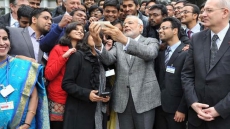WASHINGTON — As a young girl growing up in suburban Chicago, Hillary Rodham decided she'd never change her last name. Three decades later, an entire state debated her childhood choice.
Arkansans grumbled about invitations to public events from Gov. Bill Clinton and Hillary Rodham. Businessman Frank White, the Republican challenging Clinton's bid for re-election in 1980, made a point of referring to his wife as "Mrs. Frank White."
Bill Clinton lost that race. But it was his wife who ended up making the most lasting recalibration.
"I'll be Mrs. Bill Clinton," she told reporters in February 1982, on the day her husband announced his intention to run again for the office he'd lost. "I suspect people will be getting tired of hearing from Mrs. Bill Clinton."
Today, they hear from Hillary Clinton. That's the name aides to the front-runner for the Democratic presidential nomination say she now prefers. You might not know that from looking at her campaign website, on which she's simply referred to as Hillary.
She was Hillary Rodham Clinton throughout her time as first lady and secretary of state. That was also the name she used as an author of two bestselling memoirs and how she signed legal documents — "H R Clinton" — as recently as this past summer.
Citing Clinton's preference, The Associated Press this past week changed its style and refers to her as Hillary Clinton. Several other news organizations have done the same.
The shifting monikers fit into an attack line Republicans have pushed for years — that Clinton is an unprincipled creature of Washington whose positions move with the political winds.
Longtime Clinton observers have a slightly different take. They say the changes reflect necessary political calculations in a country that remains conservative about family names, even as family structures have become less traditional.
"Given the pattern that evolved, she clearly had strong feelings about her name," said Max Brantley, an editor at the Arkansas Times who has known the Clintons since 1974. "She kept trying in various ways to hang on to it."

Roughly 8 per cent of married women in the U.S. use their maiden names alone, while 17 per cent use their maiden names in connection with their husband's last name, said Pennsylvania State University sociologist Laurie Scheuble, who's studied the choice of last names by married women and based her research on census data.
"When Clinton drops her first surname, she's just following the norms in society," Scheuble said. "She wants to be president and middle America doesn't want her to be Rodham. It's a good political position to take."
That was certainly the opinion of Arkansas voters all those decades ago. Statewide polls later found that her use of her maiden name had cost Bill Clinton as much as 6 percentage points in that unsuccessful race for governor.
Longtime friend Ann Henry urged Clinton to make the change after the loss. "I'm sure it was a hard choice for her to make, because she had been steeped in what women could do up East and she'd given that up to come down here," Henry said.
Bill Clinton later said he tried to talk his wife out of changing her name, saying he did not want her to resent the choice — and him — for the rest of her life. But she countered that it wasn't worth it to keep both names.
He recalled in a 1994 interview with The New Yorker that she said, "'We shouldn't run this risk. What if it's 1 per cent of the vote? What if it's 2 per cent? You might win or lose the election by 2 per cent.'"

Nearly a decade later, when she arrived in Washington after Bill Clinton's election as president and took on a role at the White House focused on health care policy, the then-first lady began using the name Hillary Rodham Clinton. Polling at the time showed that 9 per cent of Americans thought the change was a good idea, 21 per cent a bad idea — and 69 per cent said it didn't much matter.
"Hillary Rodham Clinton has been the first lady's name all along," an exasperated Lisa Caputo, then Clinton's press secretary, explained to reporters at the time. "We're at all a loss as to why people think this is something that we're just trying to change now."
She ran for the Senate in New York as "Hillary," then went back to Hillary Clinton for her 2008 presidential campaign. She returned to using Hillary Rodham Clinton as secretary of state, and did so until the launch of her second White House bid this year.
Former aides and supporters predict that, unlike in Bill Clinton's race in 1980, the choice won't matter much at all when voters start casting ballots next year.

"She's been in the public consciousness for such a long time," Caputo said. "It doesn't matter if it's Hillary Rodham Clinton or Hillary Clinton. Everyone knows who she is."





